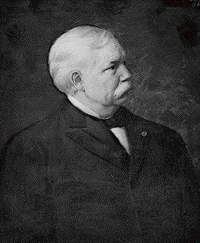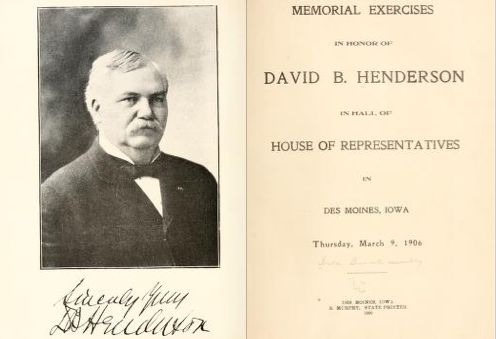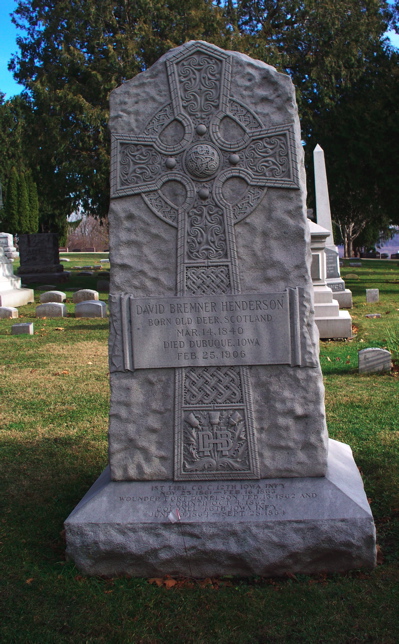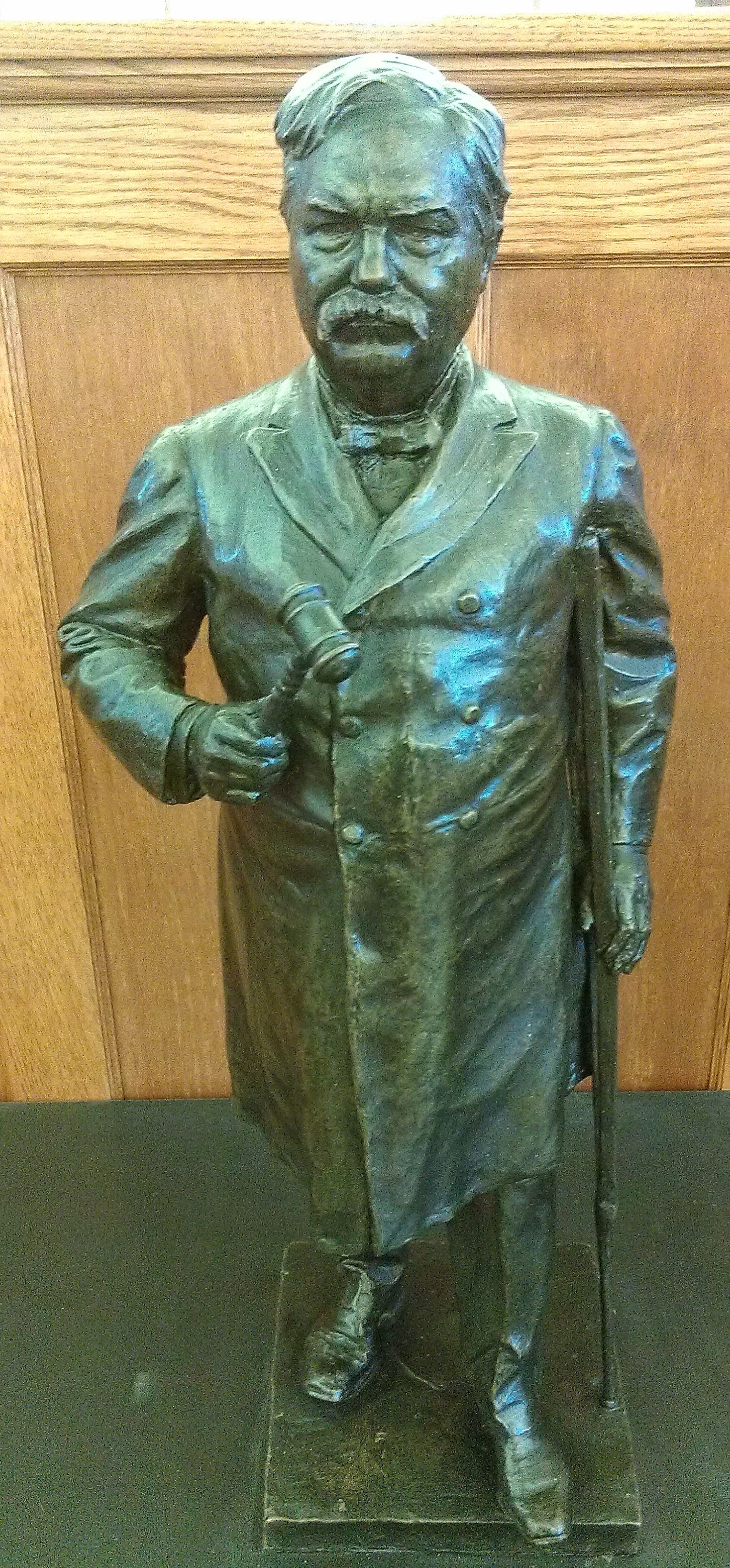Encyclopedia Dubuque
"Encyclopedia Dubuque is the online authority for all things Dubuque, written by the people who know the city best.”
Marshall Cohen—researcher and producer, CNN
Affiliated with the Local History Network of the State Historical Society of Iowa, and the Iowa Museum Association.
HENDERSON, David B.
Family History: http://wc.rootsweb.ancestry.com/cgi-bin/igm.cgi?op=GET&db=:2363390&id=I114
HENDERSON, David Bremner. (Old Deer, Scotland, Mar. 14, 1840-Dubuque, IA, Feb. 26, 1906). Henderson emigrated to the United States with his parents, who settled in Winnebago County, Illinois, in 1846. They moved to Fayette County, Iowa. The family lived in what became known as Henderson Prairie a few miles west of Postville. (1) In 1849 he attended the common schools and then Upper Iowa University at Fayette. (2)
Henderson was a leader in organizing a company of students at the beginning of the CIVIL WAR. (3) They enlisted in the Union Army September 15, 1861, as Company C, Twelfth Regiment, Iowa Volunteer Infantry. Henderson was elected and commissioned first lieutenant of that company and served with it until discharged, owing to the loss of a foot, on February 26, 1863. (4) Using personal and political friendships, he was appointed commissioner of the board of enrollment of the third district of Iowa from May 1863 to June 1864. (5) In June 1864 he re-enlisted in the Army as a Colonel of the Forty-sixth Regiment, Iowa Volunteer Infantry, and served until the close of the war. (6) His regiment served near Memphis, Tennessee mostly doing guard duty along the Memphis and Charleston Railroad.
Henderson studied law and was admitted to the bar in 1865. He served as the collector of internal revenue for the third district of Iowa from November 1865 to June 1869 when joined the law firm of Shiras, Van Duzee, and Bissell upon the death of Attorney General Bissell. (7) Henderson served as the assistant United States district attorney for the northern district of Iowa 1869-1871. (8)
Henderson became involved in politics at about the same time. He attended the Republican convention several times and chaired the Iowa delegation in 1880 when he endorsed James G. Blaine for the presidential nomination (9)
Henderson was elected as a Republican to the Forty-eighth and to the nine succeeding Congresses (March 4, 1883-March 3, 1903). (10) His closest election came in 1890 during a Democratic landslide when he was re-elected by only 198 votes. (11) Henderson served as chairman, Committee on Militia (Fifty-first Congress), Committee on the Judiciary (Fifty-fourth and Fifty-fifth Congresses), and Committee on Rules (Fifty-sixth and Fifty-seventh Congresses). (12) He was seen as Speaker of the House Thomas B. Reed's right-hand man. (13) Henderson was a supporter of high protective tariffs; liberal pensions for Civil War veterans, widows and orphans; rural mail delivery; and laws to prevent the growth of monopolies. (14)
By 1899 Speaker of the House Reed had become increasingly unpopular. He was seen as domineering and his anti-imperialist beliefs were not those of the expansion-minded nation. When he resigned his seat and returned to his New York law practice, Henderson quickly moved to take the position and became the first person from states west of the MISSISSIPPI RIVER to achieve the powerful position of Speaker of the United States House of Representatives (Fifty-sixth and Fifty-seventh Congresses). (15)
As speaker, Henderson saw himself not only representing national interests but those of the Republican Party. Endorsing the candidacy of James A. Garfield for president of the United States, Henderson informed the candidate that a victory in Indiana was absolutely critical and that more money was needed. He also informed Garfield not to count on the active support of Senator Rosco Conkling, a powerful Republican from New York. (16)
Henderson openly favored Dubuque county residents when positions became available in Washington, D.C. Members of what was called the "Dubuque Colony," were George Armstrong of Farley (superintendent of the Arlington Park), W. J. Catillon of Dubuque (assistant sergeant of arms in the House), John K. Duncan of Dubuque (superintendent of elevators in Washington), and Bert Levens who received a position on the Washington police department. (17)
On July 1, 1902 Speaker Henderson addressed the colleagues declaring that "no house of representatives since the adoption of the Constitution had done so much work as this one." He was alluding to the passage of the bill providing $170 million to acquire land and begin construction of the Panama Canal. The congress had also passed the Newlands Reclamation Act which set aside revenue from the sale of western lands into a national fund for the construction of dams and irrigation projects. Congress had also appropriated more than half a million dollars for renovations to the White House. So taken were the members of the House that they stood cheering wildly and applauding before singing 'My County, Tis to Thee." They were joined by the correspondents in the press gallery who then then joined by all the spectators for the singing of the "Star-Spangled Banner." The jubilation ended with General Charles Hooker of Mississippi, a Confederate veteran, standing beside the Speaker as they both sang 'Dixie.' (18)
Henderson's withdrawal from the congressional race in 1902 was due to both local and national political pressures. After President McKinley's assassination, Theodore Roosevelt became president in 1901. Henderson began to be considered a conservative roadblock in an era of progressive reform. (19) He was left off a tariff conference in Washington and resented several Waterloo progressives who attacked him for his protectionist views on tariffs. (20)
Henderson retired from Congress to practice law in New York City. (21) Poor health including "paresis," a progressive degeneration of the brain and pain from his leg surgery led to his return to Dubuque. He suffered a complete mental breakdown before his death. (22)
It is not often remembered that Henderson had a prominent role in Dubuque's baseball history. Ted Sullivan, one of the game’s foremost organizers, formed and ran the Northwest League which consisted of three clubs from Illinois, Davenport, Omaha and Rockford, and Dubuque, Iowa. It was the first so called minor league formed outside the east coast. Sullivan took steps to set a salary structure for the Northwest League and clearly subordinated the league to the National League, which to some establishes it as the first legitimate minor league. Sullivan ran the Dubuque team which was financed by Henderson and Iowa’s U.S. Senator William Boyd ALLISON. (23)
See: HENDERSON DRUM CORPS
---
Source:
1. Schroeder, Stan. "Prominent People of the Pale Past," http://www.sharylscabin.com/Allamakee/history4/palepast_4.htm
2. Hudson, David; Bergman, Marvin; Horton, Loren. The Biographical Dictionary of Iowa. Iowa City: University of Iowa Press, 2008 p. 227
3. Ibid.
4. Special Collections Department, University of Iowa. "Papers of David Bremner Henderson," http://www.lib.uiowa.edu/spec-coll/MSC/ToMsc100/MsC95/MsC95_hendersondavidb.html
5. Hudson, p. 228
6. Schlup, Leonard. "David B. Henderson and Republican Politics in Gilded Age America," Julien's Journal, January 1997, p. 22
7. Tigges, John. They Came From Dubuque.
8. Oldt, Franklin T. The History of Dubuque County, Iowa, Chicago: Western Historical Company,p. 804
9. Schlup.
10. Special Collections Department, University of Iowa. "Papers of David Bremner Henderson"
11. Schlup, p. 23
12. "David Bremner Henderson," Biographical Directory of the United States Congress. http://bioguide.congress.gov/scripts/biodisplay.pl?index=H000478
13. Hudson, p. 228
14. Schlup, p. 23
15. Upper Iowa University. "UIU's First Success Stories," http://www.uiu.edu/alumni-success/first-success-stories.html
16. Schlup, p. 23
17. "Many Provided For," Dubuque Daily Telegraph, p. 8
18. Goodwin, Doris Kearns. The Bully Pulpit. New York: Simon and Schuster, 2013, p.305-306
19. Schlup, p. 24
20. Ibid.
21. "History of Dubuque and Dubuque County." Telegraph Herald, Jan. 15, 1939, p. 5. Online: http://news.google.com/newspapers?id=dtdBAAAAIBAJ&sjid=BaoMAAAAIBAJ&pg=5766,3140247&dq=dubuque+electric+company&hl=en
22. Schlup, p. 24
23. McKenna, Brian. "Old Hoss" Radbourne. Society for American Baseball Research. SABR Baseball Biography Project, Online: http://sabr.org/bioproj/person/83bf739e










